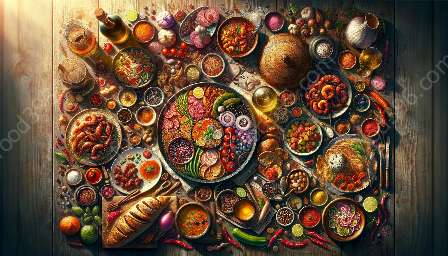Brazilian cuisine is a melting pot of flavors, reflecting the diverse cultural influences and culinary traditions that have shaped the country's food culture over centuries. From indigenous ingredients to Portuguese, African, and indigenous flavors, Brazilian cuisine offers a rich gastronomic tapestry. Let's take a journey into the vibrant world of Brazilian culinary delights, exploring the history, flavors, and iconic dishes that define this mesmerizing ethnic cuisine.
The Historical Roots of Brazilian Cuisine
The roots of Brazilian cuisine can be traced back to the indigenous communities that inhabited the land for thousands of years. These early inhabitants cultivated native ingredients such as cassava, corn, and a wide variety of tropical fruits, which form the backbone of traditional Brazilian dishes.
With the arrival of the Portuguese explorers in the 16th century, Brazil's culinary landscape underwent a significant transformation. The introduction of European ingredients and cooking techniques, such as spices, livestock, and wheat, heavily influenced the development of Brazilian cuisine.
However, it was the arrival of enslaved Africans that had an enduring impact on Brazilian food culture. African culinary traditions and ingredients, including okra, palm oil, and various spices, merged with indigenous and European influences, giving rise to a truly diverse and unique cuisine.
The Flavor Palette of Brazilian Cuisine
Brazilian cuisine is celebrated for its vibrant and varied flavors, showcasing a wide array of ingredients and cooking styles. From the smoky, slow-cooked stews of Bahia to the delicate seafood dishes of the coastal regions, each culinary tradition offers a distinct taste of the country's rich cultural heritage.
The use of tropical fruits, coconut milk, and fresh seafood characterizes the cuisine of coastal areas, while the heartier, meat-centric dishes of the interior reflect the influence of European and indigenous cooking techniques. Brazilian cuisine also makes ample use of spices and herbs, such as cilantro, cumin, and malagueta peppers, infusing dishes with layers of savory, spicy, and tangy flavors.
Iconic Brazilian Dishes
As diverse as the country itself, Brazilian cuisine boasts an array of iconic dishes that have captured the hearts and palates of food enthusiasts around the world. Feijoada, often considered Brazil's national dish, is a hearty stew made with black beans and a variety of smoked and fresh meats, slow-cooked to savory perfection.
Coxinha, a popular street food, features shredded chicken encased in a dough, shaped into a teardrop, breaded, and fried to a golden crisp. Pão de queijo, or cheese bread, is a beloved snack made with tapioca flour and cheese, creating a chewy, cheesy treat enjoyed by Brazilians of all ages.
Moqueca, a traditional seafood stew originating from the coastal state of Bahia, is a tantalizing blend of fish, onions, tomatoes, cilantro, and coconut milk, simmered to create a fragrant and flavorful dish that encapsulates the essence of Brazilian coastal cuisine.
Celebrating the Cultural Significance of Food
Food holds a profound cultural significance in Brazil, where mealtimes are viewed as opportunities for fostering social connections and collective joy. Whether it's the communal sharing of traditional dishes during festive occasions or the vibrant street food culture that permeates the bustling markets, Brazilian cuisine embodies a spirit of conviviality and unity.
Moreover, the concept of churrasco, or Brazilian barbecue, represents a time-honored tradition that brings communities together over the sizzle of tender, flame-grilled meats. Served with an assortment of side dishes and accompanied by lively conversation and music, churrasco exemplifies the convivial spirit that underpins Brazilian food culture.
Embracing Brazilian Cuisine
As we immerse ourselves in the vibrant and diverse world of Brazilian cuisine, it becomes evident that this culinary tapestry emerges from a rich history, a colorful blend of cultural influences, and a passion for good food. Capturing the essence of Brazil's diverse traditions and regional flavors, Brazilian cuisine shines as a testament to the country's culinary prowess and unites people through the universal language of good food.

